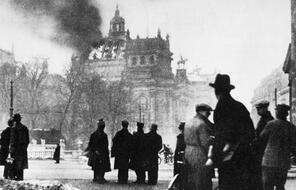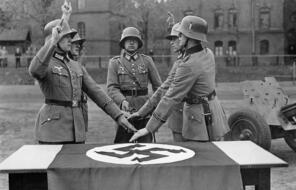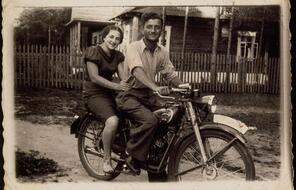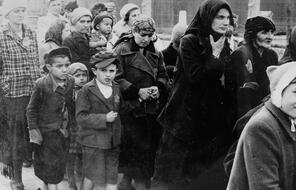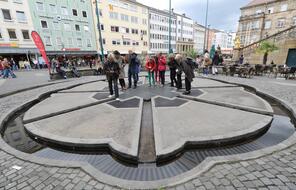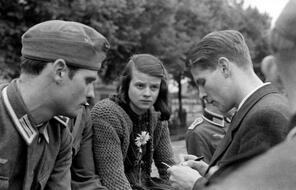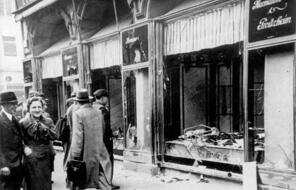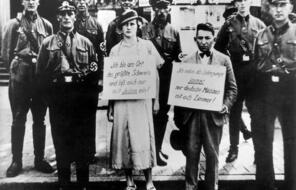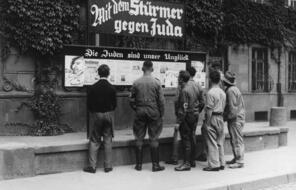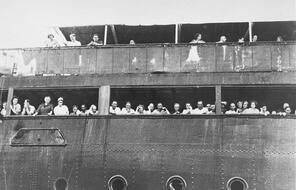Interview with Benjamin Doron, Child Survivor from Libya
At a Glance
Language
English — USSubject
- History
- Social Studies
- The Holocaust
In the fall of 1940, the British entered Libya, which was under Italian colonial control. Then, between December 1940 and January 1943, control of Libya went back and forth five times between the British and the Italians and Nazis. Each time the British retook Libya, the Jews would welcome them, in part because they would abolish the antisemitic race laws. This would lead to retaliation against the Jews whenever the British lost control.
Benjamin Doron was born in 1931 in Benghazi, Libya. He was the eldest of three siblings, and he lived in a Jewish community where shops were closed on the Jewish Sabbath, he went to synagogue with his family, and he attended an Italian Jewish school. His father worked at the port in Benghazi, and his mother managed the household. In the following interview, he describes how his life was impacted by the war:
The first British occupation [of Libya] began at the end of 1940 but life continued more or less normally. There were no changes in the daily family routine. Receiving the British army was a cause for rejoicing. As children, we used to get small additions in food like jam, and bread but we weren’t hungry at this point. There were a lot of bombings, and my uncles had no work.
Now according to grandmother’s story, the British authorities tracked my father down as someone who had worked in the port and since they wanted to operate the port, they got him to get things moving in the port for them. He got the other workers to report for work. Boats began to dock and nothing was missing at home.
In the spring of 1941, the Afrika Korps (German expeditionary force), led by General Rommel, arrived and pushed the British army out, ending the first British occupation. There were some Italian soldiers attached to Rommel’s army as well. This was the beginning of a much harder period for us. Firstly, someone informed on my father to the Italian judicial authority as having collaborated with the British in helping to open the port for their use. He was tried in an Italian court and sentenced to twelve years imprisonment for aiding the enemy. During this entire period it was impossible for us to see him or visit him.
When the Germans entered the city, it resulted in looting and hooligan behavior on the part of the Italians against Jewish shops and I remember this clearly. I saw it from the windows of the flat on the third floor - Italians rampaging down in the streets.
Our mother fell ill with typhus and died and we remained with our grandmother who looked after us as orphans. She moved into our apartment with Herzl our uncle, because it was on the third floor and therefore safer than the ground floor where she lived. We would use the water hole that she had in her courtyard because of water shortages, and it became my responsibility to walk to her home to fetch water for use in our flat.
We stayed at home most of the time and the only time I went out of the house was to fetch water and to go to synagogue on Friday night and Saturday morning.
Grandmother sold off her private jewelry from time to time in order to support us, and it appears that this was sufficient for us to buy food.
At the end of 1941, beginning of 1942, the British pushed the Germans out and we received the British army again with rejoicing. However this period didn’t last too long. . . . Again in 1942, the Germans returned for the second time and Mussolini ordered the Jews to be expelled from certain areas in Libya, and they had to congregate in Benghazi. The German governor together with the Italian governor demanded the creation of lists of all the Jews in Benghazi. . . . The Jews listed had to appear at a certain meeting point on a certain date, from which they were taken away in trucks. . . .
For some reason, we were at the end of the list, although some of my uncles from my father’s side were trucked out in the first convoy.
Slowly Benghazi became a ghost city with only about 250 Jews left. This was a very difficult period because the city had emptied out and it was very difficult to find provisions. Non-Jewish French and British citizens began to leave and return to their countries, and Jews of French nationality first went to Tripoli and were sent to Tunisia and those of British nationality were sent to Italy and from there some were sent to Bergen Belsen. 1
At this point we began to suffer from starvation. I became responsible for gathering food, even from the German army, like remains of jam from tins, but it wasn’t enough.
Most of the houses and shops belonging to Jews had been broken into. Grandmother then had an idea that I should go into broken-down houses and look for food, which I began to do, and I succeeded in finding enough food to keep us afloat: beans, tomatoes etc.
One day, around August or September, we finally had to leave on one of the trucks. Grandma prepared a load for each one to carry – a little food, blankets. When we reached the main road to Tripoli, a German roadblock stopped us and returned us to the city. We were told to get off the trucks and we headed for Grandma’s house near the sea. When we got there, her Arab neighbor said it was better for us to stay only one night and to leave the area of the city for a certain village further out, probably because of the aerial bombings. He had already sent his own family there. So the next day we started out and my sister and I remember resting and sleeping in the Jewish cemetery on the way out of the city. By evening after walking the whole day, we arrived in the small village made up of mud huts with all the activity centered around the watering well. The Arab neighbor accompanied us to the village since his own family was there and we remained there until the end of the war. We were given a small single room wooden hut and subsisted on the basics that the Arab neighbor would bring to Grandma every so often, such as bread, beans, water from the well. As before, her manner of paying for his keeping us alive was with a piece of her jewelry from time to time.
We were the only Jewish family in the vicinity and were under his protection, until the beginning of 1943 when Grandma told us to gather our belongings, and we returned to Benghazi to both houses, which had been broken into. 2
- 1A Nazi concentration camp in Germany.
- 2“Interview with Benjamin Doron, Child Survivor from Libya,” n.d. www.yadvashem.org.
How to Cite This Reading
Facing History & Ourselves, "Interview with Benjamin Doron, Child Survivor from Libya," last updated June 30, 2023.
This reading contains text not authored by Facing History & Ourselves. See footnotes for source information.

